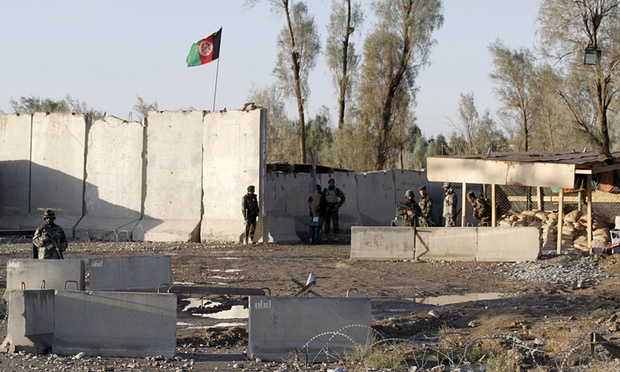Taliban Attacks Airfield In Kandahar, Kills 37
Afghan security forces at the entrance of Kandahar airport

NEW DELHI: At least 37 people, including many children, were killed at the Taliban attacked a heavily fortified civilian and military airfield in the southern Afghan city of Kandahar. All nine militants involved in the 26 hour long siege have been killed.
The airport compound in Kandahar houses Afghan military and civilian sections as well as a Nato base. Reports indicate that the militants, dressed in military uniforms and heavily armed, breached the first gate and then entered an old school building where they clashed with security forces.
Kandahar airport director Ahmadullah Faizi told AFP news agency that some passengers waiting to board a commercial flight to India had been trapped inside the airport's civilian terminal, at some distance from the fighting, during the attack. BBC News reported that some of the militants took families hostage and used them as human shields. Witnesses said they could hear Afghan soldiers calling on the militants to let women and children escape unhurt.
The attack continued late into Wednesday night, until one gunman who had held out on his own for several hours was killed. In addition to the 37 people killed, another 35 were injured.
US Army Col Michael Lawhorn said the Taliban fighters "never physically entered the airfield". There were no coalition casualties, Col Lawhorn said. However, analysts have concluded that the attack was a major security breach, as heavily armed militants were able to enter a fortified area supposed to have been made secure by the Afghan National Security Forces (ANSF).
The Taliban claimed responsibility for the attack, and said that 80 Afghan soldiers were killed. This could not be confirmed.
Separately, the Taliban claimed to have captured Khanashin district in southern Helmand province. A local official confirmed the district had fallen.
The attack represents the enhanced push by the Taliban, who captured the important city of Kunduz a few weeks earlier. The fall of the city prompted the US to revise its withdrawal plan, with President Barack Obama announcing that thousands of troops will remain in Afghanistan at least till the end of his term in 2017. The decision marks a major reversal of U.S. policy, with one of Obama’s key commitments having been the end of the war in Afghanistan and bringing U.S. troops home.
Kunduz, however, was the first in a series of successes as the emboldened militants saw gains in southern Helmand province, approaching Lashkar Gah, raising their flag in the main centre of Ghurian district, and taking over Warduj district.
The attack on the airport is the latest in a string of amped up attacks, as the Taliban responded to the death of their leader Mullah Omar with renewed violence. Omar’s death seemed to remove a unifying figure, and the section of the Taliban that was opposed to peace talks with the Afghan government -- an initiative agreed to by the Mullah Akhtar Mohammad Mansour faction of the Taliban -- reneging their pledge to uphold Mansour’s command.
The attack comes as Afghan President Ashraf Ghani spoke of the need to defeat terrorism at the “Heart of Asia” conference in Pakistan -- a country that Afghanistan has shared a shaky relationship with in regard to terror. Afghanistan, especially under former President Hamid Karzai, has maintained that Pakistan aids and abets terrorism. Ghani came to power having adopted a different policy -- that of reaching out to Pakistan, as skeptical critics looked on.
The improved ties with Pakistan enabled the nascent peace dialogue with the Taliban to take shape, as Islamabad used its leverage on Mansour to push the militants to agree to talks with the government. The talks, however, were dealt a severe blow with Omar’s death, as the Taliban launched an all out offensive against Kabul.
The step up in violence compelled Ghani to change his tune and hit out at Pakistan in as strong a language employed by Karzai. Ghani’s visit to Islamabad and Pakistan hosting the “Heart of Asia” are initial steps to improve ties again, but the Taliban seems to have escaped the narrative as Pakistan, even if willing, will have a hard time imposing its writ on a deeply divided Taliban, half of which rejects Mansour’s leadership.
To make matters worse, Kandahar army commander Sher Shah told reporters that radio intercepts had found that some militants were speaking in Urdu - a language more common in neighbouring Pakistan, indicating that the militants were probably from across the border.



